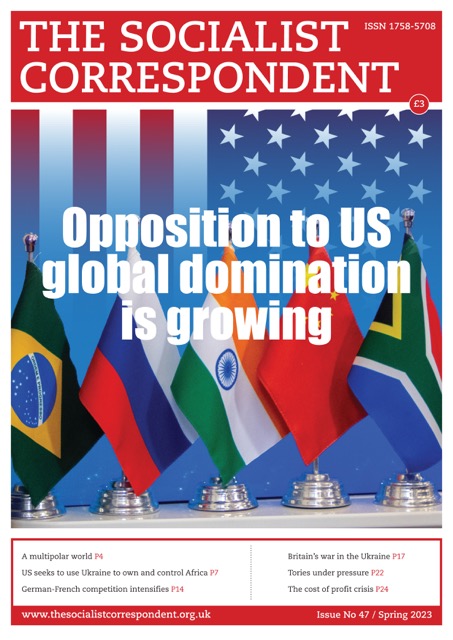Issue 47 Spring 2023
CONTENTS: A multipolar world, Frieda Park: US seeks to use Ukraine to own and control Africa, Alex Davidson: The Israeli election: an own goal? Brian Durrans: German-French competition intensifies, Simon Korner: Britain's war in Ukraine, Gregor Tassie: European protests against war, NATO and EU energy policy, Marianne Hitchen: Tories under pressure, Helen Christopher: The cost of profit crisis, Sacha Grear: Yemen - The People's Democratic Republic 1970-90, Pat Turnbull: Mikhail Gorbachev - The real legacy, Gary Lefley
Commentary
The war in Ukraine is changing the world both in ways that might have been predictable, but also in unexpected ways.
US dominance leads to division and defiance
The war was born out of the United States desire to remain the world’s only superpower and it has continued to signal its aggressive intent, particularly in relation to China. The US wanted to contain and push back Russia, but it also wanted to force the European Union, especially Germany, cut off trade with Russia, particularly in relation to oil and gas and thus make it dependent on America instead.
The fallout from this has increased tensions in the EU and stoked traditional rivalries between Germany and France who vie for leadership of the bloc. Simon Korner describes how this is unfolding in, German-French Competition Intensifies. Two main areas of dispute are round energy and each countries’ military power. Germany is seeking to manipulate EU policy aimed at combatting the self-inflicted energy crisis to protect its own interests at the expense of other EU countries. Likewise, it is asserting itself as a military power, hugely increasing arms spending and threatening France’s military leadership in the EU. Such tensions are not likely to decline, but only to get worse.
In other parts of the world the United States’ attempts to bully countries into line over Ukraine have not had the same success as in Europe. In US Seeks to Use Ukraine to Own and Control Africa, Alex Davidson points out that countries representing nearly half of the world’s population have failed to support the US position on Ukraine at the United Nations. In return the United States is seeking to sanction African states who do business with Russia through its “Countering Malign Russian Activities in Africa Act”. The US also has a widespread military presence on the continent with 29 military bases under the United States Africa Command - AFRICOM. While African countries have shown signs of defiance over Ukraine, America has no intention of giving up the fight for control of its rich natural resources.
The BRICS (Brazil, Russia, India, China, South Africa) countries are also among those taking issue with the US trying to impose its will on the world. Their alliance is one of a growing number of bi and multi-lateral agreements between countries of the global south which seek to develop trade and cooperation on a more equitable basis and now also circumventing the restrictions which the United States is imposing through sanctions. Though it remains at present massively dominant, the United States unipolar world is increasingly being challenged. What A Multipolar World might look like is explored by Frieda Park. Its benefit would be to break US power and open up the possibility of progressive change. Such a world, and the fight to achieve it, will not be without complications and challenges. It is, therefore, vital to support those opposing US imperialism, to defend the sovereignty of nations and to oppose US sanctions and its drive to war.
Britain and Ukraine
Whilst the fall out from the war in Ukraine has increased opposition to US policies in many parts of the world, the biggest, long-standing imperial powers have fallen into line behind its war aims. The UK has gone further than others in stoking up the war as Gregor Tassie sets out in Britain’s War in the Ukraine. After the United States it supplies the most resources to Ukraine, including vast amounts of military equipment. The UK’s active involvement not only extends to arms supplies, there are British troops deployed in the country and British intelligence is being provided to Ukraine. There are reports that Britain has been involved in major incidents such as the blowing up of the Nord Stream pipelines.
Though profitable for Britain’s military-industrial complex, British people could well use the cash being poured into Ukraine to meet their demands for reasonable wages and to improve the critical state of public services.
Trade unions fight on
Trade union members are not only heroically battling on with their campaigns of strike action, they are now being joined by more groups of workers.
In The Cost of Profit Crisis, Sacha Grear makes it plain that the wage demands of unions are entirely affordable and contrasts the declining living standards of workers with the growth in profits and in the wealth of billionaires. He makes the point that this, therefore, is a political choice in favour of capital and against the working class, not an economic necessity. This is underlined by Helen Christopher in Tories Under Pressure. Though they managed to wriggle out of the crisis caused by Liz Truss’ disastrous premiership, the Tories still face multiple problems. The party remains riven by divisions. Simply allowing public services to fall apart and taking a confrontational stance towards strikers doesn’t seem to be going down well. Many more people support the strikes than oppose them, with striking nurses achieving over 60% approval ratings.
Christopher says, “There is an opportunity for the working class and the trade unions to take advantage of the Tories difficulties, to build greater unity of strike actions and campaigns and make gains.”
Read the PDF version of Issue 47

